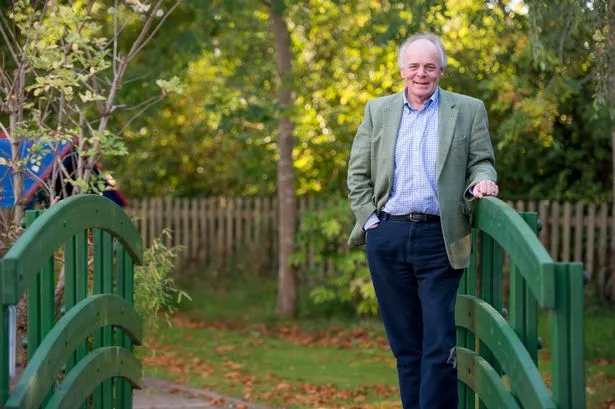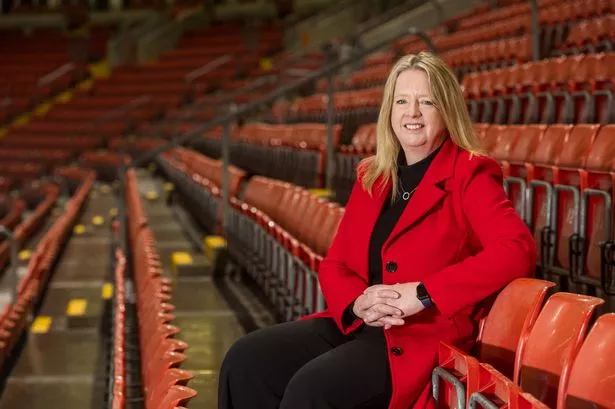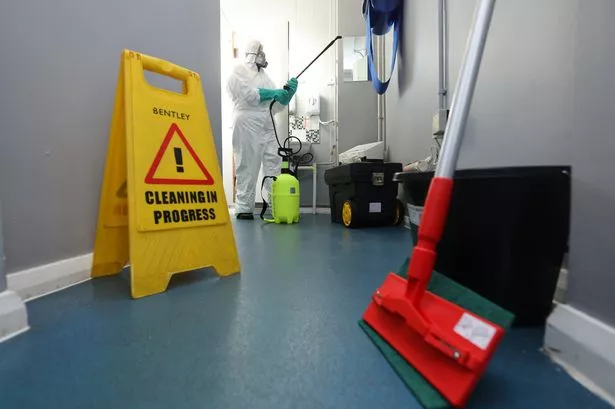
Fear and worry over 'deeply sad' Oakwood closure as locals vow to fight on
There are fears that the closure of one of the UK's biggest theme parks could merely be "the tip of the iceberg" when it comes to the long-term future of the tourism industry in Wales. Oakwood Theme Park in Pembrokeshire has attracted tourists of all ages since it first opened in 1987, drawing in visitors from across Wales and beyond. But in a shock announcement on Tuesday, the site's owner Aspro Parks confirmed that Oakwood would not open in 2025 and was closing for good. The Spanish company bought the theme park in 2008 from the McNamara family, who have since gone on to open and develop another of Pembrokreshire's key attractions, Bluestone Resort, located next door. Read the biggest stories in Wales first by signing up to our daily newsletter here. Together the two sites, along with nearby Folly Farm among others, made west Wales a huge draw for families from across the UK. Tuesday's announcement has naturally brought sadness over confirmed job losses, but also deeper concern about the wider impact that the closure could have. According to its LinkedIn profile Oakwood employed up to 200 people during its open season, typically between April and November. Samuel Kurtz, member of the Senedd (MS) for Carmarthen West and South Pembrokeshire, has said he has been in touch with a local business who may be able to offer employment to some of those affected, while the Welsh Government said on Wednesday that it is "ready to offer support to the workforce affected by this decision" although precise details of the nature of that support have not been confirmed. Aside from job losses, what of the wider impact on tourism in a part of Wales which absolutely depends on it? It could be huge, according to the Wales Tourism Allowance (WTA), which aims to provide a collective voice to highlight the views of the tourism industry to the Welsh Government and beyond. "This is disappointing news for Welsh tourism and jobs", a spokeswoman for the WTA said. "In Pembrokeshire over 20% of working people are employed in tourism and hospitality, so this closure won't just impact the Park's employees, it will negatively affect the local economy as a whole. A combination of Welsh Government and UK Government decisions including increased national insurance, council tax premiums, 182-day minimum occupancy for holiday lets and proposals for the Welsh visitor levy (tourist tax) risk seriously damaging the Welsh tourism and hospitality industry which contributes £3.8bn to the Welsh economy annually. "In a recent evidence session to the Senedd finance committee, Mark Drakeford MS denied that these policies would be having a cumulative effect on the tourism industry. It is surely becoming obvious that a single sector cannot swallow so many changes without there being a cumulative - and wide-ranging - effect which will filter out to the whole economy. Many parts of Wales are reliant on tourism and have limited alternative employment opportunities. This means that without jobs in tourism and hospitality local people may be forced to leave their communities in search of work. We fear that this closure is just the tip of the iceberg for Welsh tourism." Also worried about a "challenging trading environment" gripping the tourism industry at the moment is Emma Thornton, the chief executive officer of Visit Pembrokeshire. She said: "It is with tremendous sadness that we received the news of Oakwood's immediate closure yesterday evening. As Wales's largest Family Adventure Theme part Oakwood has been part of the tourism landscape in Pembrokeshire for over 40 years, a key attraction for visitors and residents alike and part of our tourism heritage. Our hearts go out to all the staff, suppliers and contractors who will be impacted by its closure. It's a stark reminder of the challenging trading environment currently being experienced. Against this backdrop Visit Pembrokeshire continues to work hard to support our tourism sector and to raise the profile of Pembrokeshire as a world class destination." At the coalface of the industry, there is hope that Oakwood's closure will not have a damaging impact on visitor numbers. "I don't think it made much of an impact on us," said Matt Gardner, owner of Quarry Park Camping, a popular site around five miles from Oakwood. "In recent years Oakwood has had a pretty bad press and the ride selection has been poor, with rides being closed and so on. A lot of people chose not to go there. I think if people wanted to spend a lot of money on a family attraction they would drive past it and go to Folly Farm or somewhere else. I don't think it's going to make a massive difference. Pembrokeshire has enough to draw people in. There are huge things on offer here which bypass Oakwood. We are an outdoors county, it's a naturally beautiful county. I don't think Oakwood was the big draw." Gareth Gamage, who owns The Folly, a campsite around half a mile from Oakwood, agreed. "There's been a decline (at Oakwood) in the last few years. It has not been the 'go to' place and Bluestone and Folly Farm still attract people here - there's something for everyone at Folly Farm whether it's wet or dry." As well the loss of jobs at Oakwood, there will be intrigue about what happens to the land that once welcomed thousands of visitors every year. It's a vast space, one that overlooks the hugely popular Bluestone Resort. Nobody from the resort was available on Wednesday to answer specific questions about its neighbouring attraction's demise, but a spokeswoman did say: "We're saddened to hear the news about Oakwood Theme Park, which has been a much-loved attraction in Pembrokeshire for many years. As a neighbour, we recognise its contribution to local tourism and the many memories it has created for visitors and residents alike. At Bluestone, we remain focused on delivering high-quality experiences for our guests and supporting the continued success of Pembrokeshire's tourism economy." Local MS Samuel Kurtz said Oakwood's closure is an example of the "challenges" facing those trying to run businesses in the tourism industry in Wales. He said: "This is deeply sad news. Oakwood has held a special place in the hearts of many in Pembrokeshire and from further afield and many happy memories have been made there over the years. However, it's a sad reflection of the challenges facing the tourism sector and the wider economy given Labour's mismanagement at both ends of the M4. Increases to National Insurance contributions, high energy costs and the shadow cast by the proposed Tourism Tax make it a very nervous time for the sector. "While Oakwood has long been part of our diverse and exciting tourism offer in west Wales, we continue to have amazing tourism attractions and hospitality venues who I know will be working hard to welcome people to the area. I've submitted a Topical Question in the Senedd to ask what support is being made available to staff, and I've already spoken to local businesses who are keen to employee those losing their jobs. However, if anyone is impacted by this closure then I urge them contact me on samuel.kurtz@senedd.wales and my office will do all that it can to assist." A Welsh Government spokeswoman said: "This is clearly distressing news for the employees of Oakwood, their families and their local communities. We stand ready to offer support to the workforce affected by this decision."

Spire Healthcare shares plunge over quarter as group warns of cost hit despite NHS demand
Shares in Spire Healthcare, a private healthcare provider for the NHS, plummeted nearly a quarter in early trading today following a warning that increased costs could slash earnings by up to 10%. The firm anticipates a £30m impact on earnings before interest, tax, depreciation and amortisation (EBITDA) in the coming year due to hikes in National Insurance and minimum wage, as well as the expiration of its energy hedge, as reported by City AM. While Spire expects to offset some of these costs through efficiency measures, pricing adjustments, and a higher-margin case mix, it predicts adjusted EBITDA will range from £270m to £285m for 2025, only slightly above the £260m reported for 2024. In 2024, the group saw a 6.2% rise in revenue due to robust NHS demand and growth in private patients. The company recorded an 8.8% increase in revenue from NHS work and achieved a 20% volume surge in the fourth quarter, with orthopaedic procedures accounting for over 60% of this NHS work. Private patient revenue also rose by 4.3%, bolstered by strong contributions from Private Medical Insurance (PMI) and self-pay. Chief executive Justin Ash has commended the company's performance, noting a robust financial showing in a variable market: "This is a good set of results, delivering all core guidance measures in a changing market. We saw revenue growth of 6.2 per cent year-on-year and adjusted profit before tax growing 29.4 per cent. Market fundamentals remain strong, with private medical insurance coverage growing significantly and a strong partnership with the NHS." He is optimistic about the impact of their strategies stating, "Our strategy is delivering. We broadened our range of services to meet more healthcare needs in our hospitals, our clinics, in the community and at home; welcomed more NHS patients and invested significantly in our Hospital staff." Ash attributed part of this success to the workforce: "We are playing a pivotal role in helping employees stay in work or return to work; all whilst maintaining and improving our quality of care and levels of patient safety, which remain our number one priorities. I thank all our colleagues and consultant partners for their expertise and commitment." The chief executive also expressed his positive outlook: "We are excited about the future. We remain confident in the combination of structural market growth, supplemented by the potential of new Primary Care services to complement our hospitals, and a continued strategic partnership with the NHS helping to deliver waiting list reductions."

Children's Hospice South West founder and chief executive dies
The founder of a hospice charity providing care to babies and children across the West of England has died. Eddie Farwell co-founded Children's Hospice South West (CHSW) with his late wife Jill in 1991 from the laundry room of their house in North Devon to support families whose children have life-limiting conditions. The couple's two eldest children, Katie and Tom, had both been diagnosed with a rare degenerative genetic disorder that meant they did not live to reach adulthood. At the time, the family’s only opportunity for respite was a hospice in Oxford, so the duo launched a £1m fundraising appeal to set up their own in Barnstaple in 1995. Huge demand for its services led to an appeal to build Charlton Farm, near Bristol, which opened in 2007 and was followed by Little Harbour in St Austell in 2011. Mr Farwell was awarded an MBE for his services to charity and children’s palliative care in 2014. He announced his retirement as the charity's chief executive last year, but was diagnosed with motor neurone disease just a few months later. He died of the neurological disorder on Thursday, March 27. He is survived by his daughter Lizzy. She said: "“My Dad was a kind, thoughtful, brave person always and being able to watch what he had achieved both through Children's Hospice South West and sharing wonderful moments as dad and daughter I will never forget. "Something I have always admired about my dad is his ability to inspire others, make people feel at ease and to warm their hearts in such a positive way, whether he has known them for five minutes or for 10 years. "Dad’s diagnosis was a huge shock, but being with him, caring for him and supporting him through his diagnosis was an honour, always maintaining his sense of humour and I wouldn’t have had it any other way. "I was with him right to the very end. He was so incredibly brave and I have lost a huge part of me in dad and miss him so much already. I take comfort from the fact that he is now at peace with my beautiful Mum, brother and sister.” Children’s Hospice South West’s incoming chief executive Phil Morris, has pledged to preserve "Eddie's legacy" and continue "advancing his mission". He said: "The heartfelt response to this news is a testament to the remarkable gift that Eddie bestowed upon our region. "It was an honour to meet him to hear his story and advice. Meeting his daughter Lizzy has further deepened my appreciation for the incredible history of our charity." Tricia Morris, CHSW chair of trustees, added: "Eddie was a remarkable man. Words do not adequately describe the legacy he leaves. In his 20 years as chief executive he has crafted a very special, caring and supportive organisation."

Boots agrees to $10bn takeover by US firm Sycamore Partners amid retail transformation
Walgreens Boots Alliance (WBA), the parent company of Boots, has confirmed a $10bn (£7.8bn) acquisition by US private equity firm Sycamore Partners. The takeover is anticipated to be finalised by year-end, as reported by City AM. WBA, listed in the US, commented on the deal: "[Sycamore's] experience in retail and consumer services would ensure WBA was better positioned to become 'the first choice for pharmacy, retail and health services'." Concurrently, WBA's CEO Tim Wentworth stated: "While we are making progress against our ambitious turnaround strategy, meaningful value creation will take time, focus and change that is better managed as a private company." Stefan Kaluzny, Managing Director of Sycamore Partners, expressed his respect for WBA's legacy and team: "For nearly 125 years, Walgreens, and for 175 years, Boots, along with their portfolio of trusted brands, have been integral to the lives of patients and customers." He added, "Sycamore has deep respect for WBA's talented and dedicated team members, and we are committed to stewarding the company's iconic brands." The implications of this deal for Boots in the UK remain uncertain. The pharmacy chain has been a staple of the British high street since its establishment by John Boot in 1849. Boots continues to be one of the group's top-performing business lines, with suggestions of a London float as recent as last year. "Sycamore will provide us with the expertise and experience of a partner with a strong track record of successful retail turnarounds," Wentworth further noted. Following the Autumn Budget, Boots, the high-street pharmacy chain, cautioned about the potential for "heightened cost pressures" in 2025. Newly appointed Nottingham-based CEO, Anthony Hemmerdinger, acknowledged that managing these costs would be challenging but assured that "the business is focused on navigating these and continuing to deliver long-term, sustainable growth." This statement accompanied Boots' announcement of an 8.1% year-on-year rise in total comparable retail sales for the first quarter of its financial year, which spanned from three months to 30 November 2024. Subsequently, WBA shares surged 27.6% ($2.54), with the health and beauty retailer attributing growth across all categories and channels, building on a notable increase in the previous year. Boots experienced a "record" Black Friday in 2024, marked by a 23% year-on-year spike in digital sales, which comprised 22% of its total retail turnover. Hemmerdinger, who assumed the helm in September 2024 following Seb James' departure, has previously held executive roles, including six years as Asda's chief operating officer and stints at Greene King, Sainsbury's, and Carphone Warehouse.

Jobs losses at the WRU as it publishes new strategy for the game
The Welsh Rugby Union has announced there are set to be job losses following the launch of the five-year 'One Wales' strategy it says will transform the game. The WRU hope the restructuring will save £5m per year and ensure its systems and structures support the new 'One Wales' strategy - which was initially promised last year - in a "manner befitting of a £100m-a-year business". Part of the transformation concerns better business - with the WRU set to discontinue part of the existing 'Hub Officer' programme - while they have also promised changes for the professional and grassroots game. The current 'hub officer' programme sees individuals who are part-funded by the WRU and educational establishments deliver rugby activities to young people across Wales. The current programme will be restructured to increase coverage, with current funding discontinued in key areas. It will be up to schools to decide how they reallocate the investment into rugby. The new Professional Rugby Agreement with the four pro teams has been agreed in principle but is yet to be ratified at board level. WRU chief executive Abi Tierney says she is confident it will be signed off soon despite this week's collapse of Cardiff Rugby that has seen the union step in to take control. In a statement, the WRU claim that the changes will put the governing body into a sustainable financial position - with £5m in annual savings and efficiencies said to have been identified. However, as part of the discontinuation of the programme, it does mean that a small number of roles, said to be fewer than 20, are at risk of redundancy. The WRU will enter a period of consultation with staff impacted. Hub Officers and schools were informed of these changes on Thursday morning, after months of uncertainty. The WRU's Hub Officer current three-year contracts were set to run out this summer and the WRU has confirmed that funding will now be withdrawn in key areas. There are around 90 officers - many of whom will be affected. It's understood that the hub officers were previously promised clarity on the end of their contracts by February. However, that never came - with many having actively looked for external roles away from the WRU amid the ongoing uncertainty. The WRU say that the majority of the saving will not come from reducing headcount, but by running the business more effectively and efficiently - "focusing on core activities that will place Welsh rugby on a long-term sustainable footing". They then plan to invest money into a restructured programme that can cover much more of the country. The plan is that the existing WRU staff will be reorganised and the number increased, with a much wider remit to ensure there is total coverage of all community clubs and educational establishments across Wales in terms of having named contact and consistent level of support. "Everything we are doing is to improve rugby in Wales for everyone," said WRU CEO Abi Tierney. "Last summer we confirmed our strategic trajectory, where we intend to be by 2029, and today we are giving further details of how we are going to get there. "The world game may have turned professional in 1995 but 2025 will be the moment we remember Welsh rugby completed this transformation, into a fully functional, fit-for-purpose, professional organisation. "Integral to our plans is a need to stop living beyond our means and ensuring we can invest in the key elements that contribute to a thriving rugby nation. This has led to the re-set at the WRU we are announcing today. There will also be investment in key areas, which will enable growth, as we complete our transformation programme. Regrettably there will also be a small number of job losses."We will make sure we look after those people affected by these changes and do everything possible to ensure their well-being and welfare during our consultation process." Sign up to Inside Welsh rugby on Substack to get exclusive news stories and insight from behind the scenes in Welsh rugby. The WRU have also proposed progressive changes to funding the community game, with a new revolutionary model set to be rolled out to better support the amateur game. Because of that, the WRU believe they are in a position to increase funding to community clubs over the next four years. As a result of the efficiencies identified, the WRU say they will also be in a position to increase funding in community clubs over the next four years. They have also announced a newly-structured performance department to ensure alignment between Wales' international teams, the professional clubs and the player pathways. The WRU once again reiterated that assuming control of Cardiff this week, after they were temporarily placed into administration on Wednesday, would not detail their plans to rebuild the professional game in Wales. As part of the announcement, the WRU said a new framework would "champion Wales' pathways for the Men's and Women's game creating new playing, opportunities, greater retention - through an enhanced offer in education - and talent tracking with a network of support across Wales and beyond". They have also promised the creation of an employee 'Centre of Excellence', which will be made up of representatives from across the performance department - meaning the four clubs will work together to identify and instil best practise on medical, SandC, nutrition, analysis and coaching matters.

Pest control firm Rentokil reports lower profit after 'challenging year'
Rentokil Initial, the pest control company, has announced a decrease in profits following a "challenging year" that saw its North American operations under pressure. The firm's revenue saw a slight increase to £5.43 billion, up 1.1 per cent from 2023, as reported by City AM. However, operating profit fell by 7 per cent to £834 million in 2024, while adjusted earnings before interest, taxes and amortisation (EBITA) rose by 4.2 per cent to £1.2 billion in 2024. Despite these challenges, Rentokil increased its dividend per share by 4.7 per cent to 9.09p. Rentokil's CEO, Andy Ransom, commented: "2024 was a challenging year for the group, with lower profits and margins, delivered in line with our trading update in September. "Good growth in the International business (Organic Revenue growth 4.7 per cent) was held back by the performance in North America (Organic Revenue growth 1.5 per cent)." After a dip in its share price due to instability in its North American business, which led to a profit warning, Rentokil returned to growth in October. The company had expanded its US workforce in anticipation of seasonal demand, but actual demand fell short of expectations. The acquisition of major US pest control company Terminix in October 2022 positioned the Crawley-based firm as a global player, but Rentokil has faced operational challenges in integrating the new business. "The Terminix integration is making good progress, with multiple important milestones achieved, but executing it has clearly impacted our North American business performance," Ransom commented.